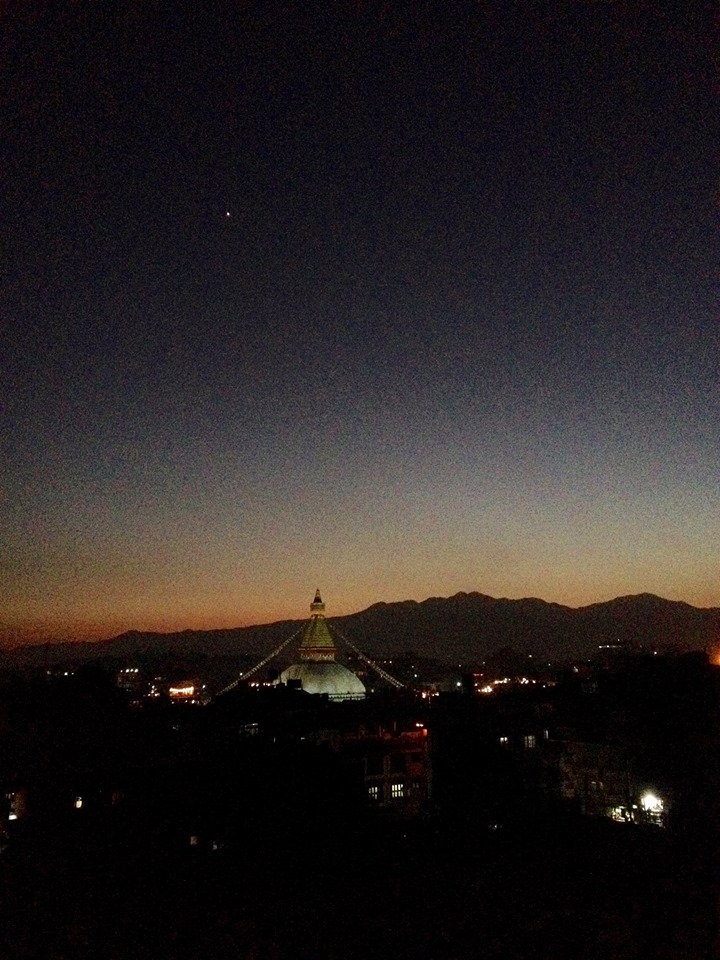I currently live in Boudha, a town on the edge of the Kathmandu Valley. It’s small, dusty and cramped, with dozens of monasteries wedged between earthquake damaged houses and Tibetan furniture stores. Monks on motorbikes compete with rug vendors, gawking tourists, and street dogs for space on potholed streets. The town revolves around a stupa, an enormous white dome, five stories high and topped with a golden turret. The stupa is said to house relics of the Buddha — from four a.m. to late in the evening, a current of people walk clockwise around its base. They hum mantras, gossip, play soccer, stand and beg, or, in my case, wander through thought.
A ring of shops and restaurants encloses the stupa. Competing cassette tape stores broadcast different mantras to the crowd. A new rendition of om mani padma hung or om tara tu tare ture soha greets me every thirty yards or so. Street dogs chase each other and bark, sometimes playful, sometimes angry. A bell rings from a nearby monastery. Two hundred pigeons peck at corn kernels beside a coffee stand. They take to the sky, squawking.
New smells pervade every couple of meters. A whiff of sewer seeps from a crack in the ground. Smoke from burning juniper leaves plumes from an offering grate. Simmering garlic wafts from a restaurant window. A sepia toned halo of car exhaust assaults me as I pass the main road. I taste metallic fumes. I hug a friend who just took a shower. His damp hair smells of mint.
I can never quite clean all the dirt from under my fingernails when I’m in Boudha. Dust cakes my scalp and clings to every pair of socks in the closet. Air pollution deposited a layer of grime in my lungs that I cough up a few times a day. Something’s always wrong with my intestines. Tiny pimples appear in surprising places.
As I walk around the stupa, I feel that Boudha permeates my body. Allow me to rephrase: I can’t access Boudha beyond my body. Sense faculties — eyes, nostrils, ears, tongue, and nerve endings — hover around the brain and transmit information about the world. We see, touch, hear, smell and taste our surroundings through a lens of flesh. The environment I blame for the hacking and the spitting and the shitting is an image I’ve gathered from places on my body, be it the insides of my digestive organs or the surface of my skin, that tell me they’ve made contact with something other. Something not me. The ear perceives a squawk, the eye sees what it presumes to be bird, and the mind sorts through its library of concepts and assigns “pigeon” to the linked phenomena. Eye and ear collaborate to produce a pigeon. My surroundings are irreducibly corporeal; I realize the fleshiness of a pothole when I stub a toe on its jagged edge.
Do I mean to say the cassette stores, the corn kernels, and the juniper leaves don’t exist? As I embrace my freshly-showered friend, do I feel the warmth of someone else, or are the cuddly neurohormones that flood my brain a response to something within the limits of my skin? Is it possible to touch something that’s not me?
Of course, if not me weren’t there — let’s call him Joe — my skin and nose and eyes wouldn’t send messages to my mind to tell me that Joe is there. Senses don’t transmit information unless Joe hits send. Joe and his minty shampoo must be out there, somewhere. Right? Maybe he is… though I can only access him in so far that I have access to the senses, and there’s no guarantee that they’re relaying an accurate message.
The body itself isn’t even quite safe. I perceive it through feeling. I can look in the dirty mirror in my room and see an image; though without the mirror, I glimpse only body parts that don’t quite measure up with the image of the whole. I might touch one hand with the other to make sure it’s really there, but when I do that, the hand in question just becomes another Joe. I might sit very very still and listen to my heartbeat. Mm-bm, mm-bm, mm-bm, mm-bm, mm-bm. Joe, Joe, Joe, Joe, Joe.
The sensual intensity of life in Boudha invites me to recollect the body’s permeability, but also its fleshy solipsism. When I recoil from toxic car exhaust, I’m given the chance to consider whether my body is a collection of moving parts in a broader environment, or whether my surroundings are a mosaic of sensations passing through a closed system. In either case, I’ve stumbled into the uncomfortable conviction that perception is unreliable; the world is not quite as it seems.
Perhaps we should leave the decisive answers to the physicists. For now, it’s more relaxing to walk around the stupa and watch the pigeons.
If this post didn’t make you as dizzy as it made me, join me next week for more irresponsible philosophy.
Love, Monica
Photo by Monica Thunder.
